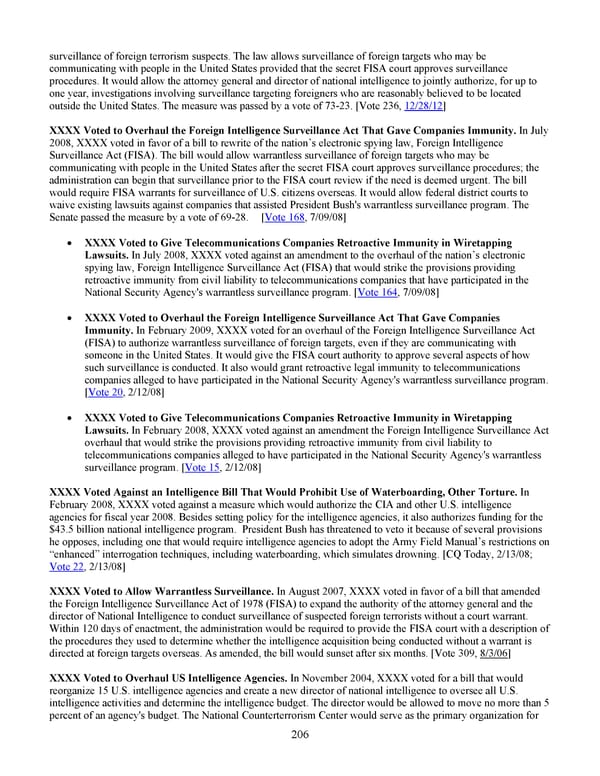surveillance of foreign terrorism suspects. The law allows surveillance of foreign targets who may be communicating with people in the United States provided that the secret FISA court approves surveillance procedures. It would allow the attorney general and director of national intelligence to jointly authorize, for up to one year, investigations involving surveillance targeting foreigners who are reasonably believed to be located outside the United States. The measure was passed by a vote of 73-23. [Vote 236, 12/28/12] XXXX Voted to Overhaul the Foreign Intelligence Surveillance Act That Gave Companies Immunity. In July 2008, XXXX voted in favor of a bill to rewrite of the nation’s electronic spying law, Foreign Intelligence Surveillance Act (FISA). The bill would allow warrantless surveillance of foreign targets who may be communicating with people in the United States after the secret FISA court approves surveillance procedures; the administration can begin that surveillance prior to the FISA court review if the need is deemed urgent. The bill would require FISA warrants for surveillance of U.S. citizens overseas. It would allow federal district courts to waive existing lawsuits against companies that assisted President Bush's warrantless surveillance program. The Senate passed the measure by a vote of 69-28. [Vote 168, 7/09/08] XXXX Voted to Give Telecommunications Companies Retroactive Immunity in Wiretapping Lawsuits. In July 2008, XXXX voted against an amendment to the overhaul of the nation’s electronic spying law, Foreign Intelligence Surveillance Act (FISA) that would strike the provisions providing retroactive immunity from civil liability to telecommunications companies that have participated in the National Security Agency's warrantless surveillance program. [Vote 164, 7/09/08] XXXX Voted to Overhaul the Foreign Intelligence Surveillance Act That Gave Companies Immunity. In February 2009, XXXX voted for an overhaul of the Foreign Intelligence Surveillance Act (FISA) to authorize warrantless surveillance of foreign targets, even if they are communicating with someone in the United States. It would give the FISA court authority to approve several aspects of how such surveillance is conducted. It also would grant retroactive legal immunity to telecommunications companies alleged to have participated in the National Security Agency's warrantless surveillance program. [Vote 20, 2/12/08] XXXX Voted to Give Telecommunications Companies Retroactive Immunity in Wiretapping Lawsuits. In February 2008, XXXX voted against an amendment the Foreign Intelligence Surveillance Act overhaul that would strike the provisions providing retroactive immunity from civil liability to telecommunications companies alleged to have participated in the National Security Agency's warrantless surveillance program. [Vote 15, 2/12/08] XXXX Voted Against an Intelligence Bill That Would Prohibit Use of Waterboarding, Other Torture. In February 2008, XXXX voted against a measure which would authorize the CIA and other U.S. intelligence agencies for fiscal year 2008. Besides setting policy for the intelligence agencies, it also authorizes funding for the $43.5 billion national intelligence program. President Bush has threatened to veto it because of several provisions he opposes, including one that would require intelligence agencies to adopt the Army Field Manual’s restrictions on “enhanced” interrogation techniques, including waterboarding, which simulates drowning. [CQ Today, 2/13/08; Vote 22, 2/13/08] XXXX Voted to Allow Warrantless Surveillance. In August 2007, XXXX voted in favor of a bill that amended the Foreign Intelligence Surveillance Act of 1978 (FISA) to expand the authority of the attorney general and the director of National Intelligence to conduct surveillance of suspected foreign terrorists without a court warrant. Within 120 days of enactment, the administration would be required to provide the FISA court with a description of the procedures they used to determine whether the intelligence acquisition being conducted without a warrant is directed at foreign targets overseas. As amended, the bill would sunset after six months. [Vote 309, 8/3/06] XXXX Voted to Overhaul US Intelligence Agencies. In November 2004, XXXX voted for a bill that would reorganize 15 U.S. intelligence agencies and create a new director of national intelligence to oversee all U.S. intelligence activities and determine the intelligence budget. The director would be allowed to move no more than 5 percent of an agency's budget. The National Counterterrorism Center would serve as the primary organization for 206
 HRC vote skeleton Page 220 Page 222
HRC vote skeleton Page 220 Page 222